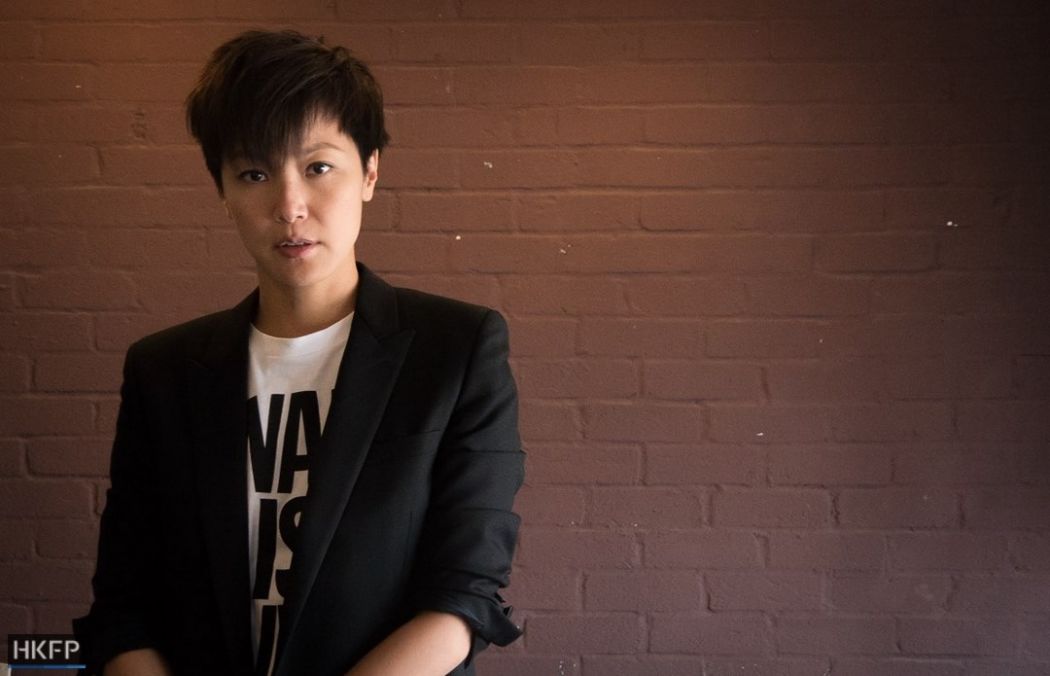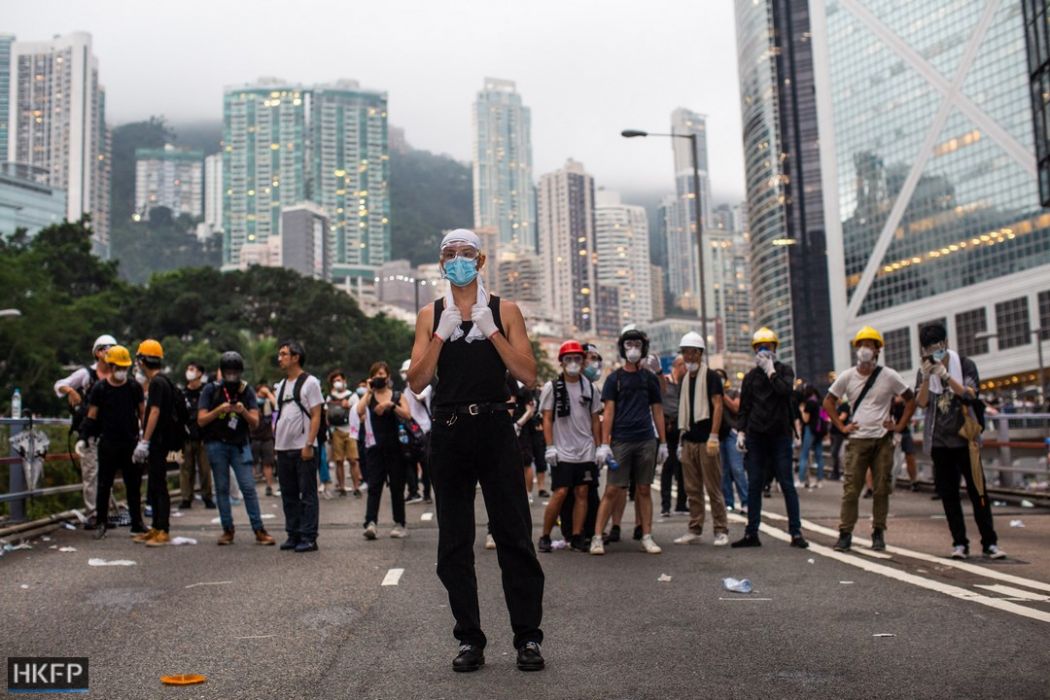
Cantopop star turned activist Denise Ho has spent the past six years protesting against Hong Kong’s political system but she still has faith in its potential to reform.
“I do think that in order to change the system you have to do it internally and also externally,” she told HKFP last week. “To try all sorts of ways to penetrate the system, to change something in the system, I think anything is worth trying.”

Ho — also known by her stage name HoCC — is a fixture at the anti-government protests which have beset the city for eleven consecutive weeks. Hardhat clipped to her backpack, the 42-year-old singer is as ubiquitous as the placards that loom above crowds.
At the unprecedented “two million-strong march” on June 17, she was there, tweeting observations to her some 224,000 followers. On Sunday, August 10, as police deployed tear gas in Kwai Chung, she was front and centre, live-streaming as plumes of smoke billowed above crowds. And the next day, as thousands of protesters flooded the airport, she was there, decoding protesters’ tactics to her 236,000-odd viewers on Facebook Live.
Three months in, public anger over the now-suspended extradition bill has been intensified with allegations of police misconduct and demands for democracy. As protesters have organised mass sit-ins and road blockades, Ho has been at the forefront throughout.
Walking shoulder to shoulder
It is a protest routine Ho has become well-accustomed to. A veteran of civil disobedience, she made a name for herself as a champion of democracy during the 2014 Umbrella Movement, which saw tens of thousands of demonstrators choke parts of the city’s centre over calls for universal suffrage. After 79 days of street occupations, police moved in to quash the movement.

Five years later, the anti-extradition law movement echoes the rallying cries and tactics of that autumn. But this time around, protesters have renounced the fixed road occupations that came to define the 2014 movement. Instead, they have adopted the concept of “be water” — as coined by the late martial arts legend Bruce Lee — to describe their fluid, guerilla-style tactics. Activists have momentarily brought traffic to a standstill and halted key transportation services – leading to, at times, violent cat-and-mouse confrontations with police.
Walking shoulder to shoulder, Ho is well-accustomed to joining protesters as they plot their next move. Fielding questions from reporters along march routes, she flits between Cantonese, Mandarin and English with ease — though, she insists, she is rusty at giving foreign language interviews.
“I try to be with them whenever I can and I try to take up that role, not in the frontlines just charging ahead, but really among them when there is chaos,” she said. “It’s difficult to witness these young people… with these homemade shields that obviously can’t protect them much from the rubber bullets and everything but I try to be with them as much as possible.”

This makeshift armour has come to dominate images of the recent unrest — a sea of figures in black wielding shields made of swimming boards and wearing bright construction helmets. The makeshift armour has been used to protect against over 1,800 rounds of tear gas and a stream of rubber bullets that have been deployed at recent protests.
But Ho says that behind the hardshell exteriors are mostly students, emboldened by the 2014 pro-democracy protests but too young to participate at the time.
“From what I’ve seen, these kids on the street, the majority of them, were mostly teenagers in secondary [school] during the Umbrella Movement,” Ho said. “A lot of the participants are actually really quite inexperienced and also quite young.”
Huge turnout at today’s rally (possibly nearing a million?🤔) morphed into a fluid two-directional March along the streets of HK.
Am feeling like a piece of 🍣sushi traveling on the conveyor belt, in an eternal loop. 🤣
Love my fellow Hongkongers!!!!#StandwithHK pic.twitter.com/Zm8B88DY7l
— Denise Ho (HOCC) (@hoccgoomusic) August 18, 2019
“Everyone on the streets right now, you just cannot have that kind of [protest] experience. The police weren’t that violent and brutal back then… so, we are really learning by the day, right now, myself included. But of course, Hong Kong people are very quick learners.”
The city’s embattled leader, Carrie Lam, defended the police’s tactics last Tuesday saying that the force considers many factors during their operations and has had a difficult time enforcing the law over the past few months. Scores of people have been injured in ongoing clashes, with one young woman suffering a ruptured eye after being hit by a suspected bean bag round. Police have also reported injuries to their frontline officers including one man who received treatment for burns caused by a an apparent petrol bomb.

Compared with the Umbrella Movement, Ho said anti-extradition law protesters have sought to innovate by learning from past mistakes.
“These kids have this quality the protesters in the Umbrella Movement didn’t have which is they are willing to reflect on each and every one of their actions and refine it, or maybe even correct something they thought they didn’t do quite well,” she added. “It is very difficult to get people to reflect on their actions, especially adults. Now, we have this young generation that’s willing to do so.”
‘White terror’
Ho’s activism has come at a price – literally. After voicing her support for the 2014 protesters, she was blacklisted from the mainland market, costing her millions of dollars. China-friendly brands cut corporate ties with her in an effort to distance themselves from her. French cosmetics company Lancôme scrapped a promotional concert by her in 2016 after a boycott campaign spearheaded by the state-backed tabloid Global Times highlighted her alleged “support” for Hong Kong and Tibetan independence.
She is not the only celebrity to feel the industry’s tightening grip on free speech. Local actress Charmaine Sheh, who appeared in the popular mainland period drama Story of Yanxi Palace, publicly apologised in June after “liking” a post on Instagram which expressed support for Hong Kong protesters. She said she “loved” her country and city. And singer Anthony Wong has had his songs partially censored in China as a result of his political activism.

“The censorship there is ridiculous,” Ho explained. “The things you can’t say in movies – not even political issues. For example, you can’t talk about ghosts in Chinese movies and the good guys must be the winners and so on. You cannot talk about LGBTQ topics. It’s really killing the creativity in Hong Kong — the whole creative industry.”
“Obviously it’s based on white terror, which is all around the whole industry. When people fear… repercussions, if you choose to speak out. So what happens is people will self-censor themselves,” she said. “These are my friends; I don’t agree with how they’re dealing with the situation but I understand why.”
Ho came out as gay in 2012 and has since been a vocal LGBTQ+ activist — an unusual quality in the conservative mainland market.
“I feel very distant with that particular scene,” she said. “I have personally experienced my friends in the industry who have kept a distance [from] me because they didn’t want to be [linked] to me. It is actually quite heartbreaking.”
But reflecting on her decision to speak out, she remains unrepentant. “I get this question all the time — do you regret voicing out, do you regret standing with the people? And the answer is, of course, no,” she said.
‘Right choice’
Ho captured headlines again last month when she spoke at the United Nations rights council about the ongoing extradition bill crisis, but was twice interrupted by a diplomat from Beijing.
Addressing the council in a one-minute speech, she condemned the bill as divisive and called on members to safeguard the city’s autonomy against what she said was encroachment from Beijing.
Dai Demao — first secretary at the Chinese mission— abruptly raised two points of order, which enables member states to speak when they believe a speaker has broken UN rules. He said Ho’s remarks were an affront to China’s sovereignty and the One Country, Two Systems principle.

“I knew that by giving that speech I would most probably become a bigger target for China. But still, at that time we had a very difficult situation in Hong Kong where there were a few young people who chose to take their lives, and there was a lot of despair among protesters. So for me, that was, first of all, a chance to make their voices heard on an international platform,” she said. “I believe I made the right choice.”
Ho was referring to four people who died between June and July, one while protesting against the bill and three others leaving notes expressing support for the ongoing protests.
She said that in spite of the backlash she does not regret voicing support for the movement. “I would rather be in this spot right now and I can be free,” she said.
Denise will appear at the Oslo Freedom Forum in Taiwan September 13. Tickets are available now.
Hong Kong Free Press relies on direct reader support. Help safeguard independent journalism and press freedom as we invest more in freelancers, overtime, safety gear & insurance during this summer’s protests. 10 ways to support us.

